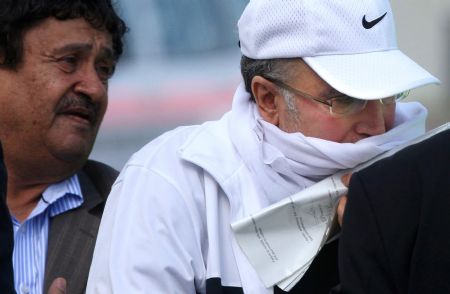Scotland's justice secretary on Monday explained his controversial decision to release the man responsible for an airplane bombing that killed 270 people over Lockerbie in 1988.
 |
|
Lockerbie bomber Abdel Baset al-Megrahi leaves a police van at Glasgow International Airport, Glasgow Scotland bound for Tripoli, after he was released on compassionate grounds by Scottish Justice Secretary Kenny MacAskill Thursday Aug. 20, 2009.[Xinhua] |
On Thursday, Justice Secretary Kenny MacAskill formally announced Abdel Baset al-Megrahi's release in Edinburgh.
Megrahi, who has terminal cancer, was allowed to return home to Libya to die after serving eight years of a 27-year minimum sentence for his part in the bombing of Pan Am Flight 103 over Lockerbie, Scotland, in December 1988.
The decision has sparked outrage, particularly among relatives of those who died.
The Scottish Parliament has been recalled a week early from summer recess to take part in an emergency session, with members of parliament expected to quiz MacAskill about his decision.
Some Scottish parliament members have criticized MacAskill for mishandling the affair from the start and have urged the government to restore Scotland's international reputation.
MacAskill said the release was based on the ideals of the Scottish legal system and compassionate grounds. "Our beliefs dictate justice is served and mercy be shown."
The justice secretary said the decision was based neither on political, diplomatic nor economic considerations, instead, on medical evidence.
"Megrahi's health has significantly deteriorated in recent times," he said.
The secretary stressed he would be responsible for his decision. "The decision to release Megrahi was my decision alone. I stand by it and I'll live by the consequence," he said.
MacAskill added that applications made for the release were lawful and the government would fully cooperate in any inquiry into the issue.
A statement from Downing Street said British Prime Minister Gordon Brown believed the early release of the Lockerbie bomber was too sensitive to comment on, local media reported.
 |
|
Lockerbie bomber Abdel Baset al-Megrahi holds his prisoner release papers as he walks toward the airplane at Glasgow International Airport, Glasgow Scotland bound for Tripoli, after he was released on compassionate grounds by Scottish Justice Secretary Kenny MacAskill Thursday Aug. 20, 2009.[Xinhua] |
Opposition parties are calling for a confidence vote over the decision to free Megrahi, but Scotland's First Minister, Alex Salmond, said MacAskill had made the "right decision" for "absolutely the right reasons."
Although Salmond insisted Scotland's relationship with the United States was still strong, Britain-US relations and Scottish businesses could suffer due to Megrahi's release as US citizens began boycotting Britain and refraining from buying British products.
The British Foreign Office has dismissed reports that ministers in London actively encouraged the Libyan's release.
On Saturday, British Business Secretary Peter Mandelson rejected the claim that the release of the Lockerbie bomber was linked to a trade deal.
"It's not only completely wrong to make such a suggestion, it's also quite offensive," Mandelson said.
The issue of the prisoner's release was entirely a matter for the Scottish Justice Minister, Mandelson added.
Megrahi reportedly flew out of Britain as a dying man deserving of compassion and landed in Libya a national hero when thousands of people gathered at Tripoli airport to welcome him as he stepped down from Libyan leader Muammar Gaddafi's private jet.
(Xinhua News Agency August 25, 2009)